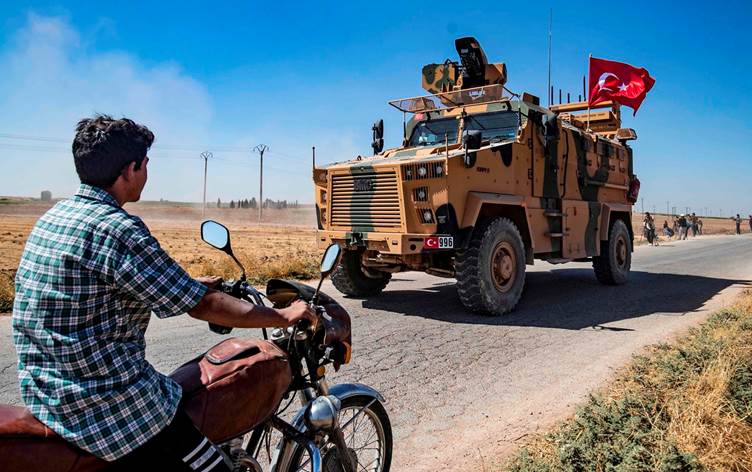
A Turkish military vehicle part of a US military convoy takes part in joint patrol in the Syrian village of al-Hashisha on the outskirts of Tal Abyad town along the border with Turkey, on September 24, 2019. The United States and Turkey began joint patrols in northeastern Syria aimed at easing tensions between Ankara and US-backed Kurdish forces. Photo: Delil Souleiman/AFP
Turkish president Recep Tayyip Erdogan used part of his UN speech last week to tout his plan for northern Syria. Mr. Erdogan announced Turkey’s intent to create a “safe zone” south of the Turkish border, initially some 30 km deep into northern Syria. The zone would be cleared of “terrorists” and used to relocate up to three million Syrian refugees currently in Turkey.
Unfortunately, such a plan would neither make the area safe nor help refugees. Erdogan’s real agenda seems to involve using Syrian refugees as pawns to destroy the Kurdish-led autonomous enclave in northern Syria.
Although Turkey has accepted more Syrian refugees than any other state since the Syrian civil war broke out in 2011 and has spent a lot of money providing for them, Turkish public opinion has begun to sour towards their guests. Hardening attitudes in Turkey seem to track closely with the worsening economy, and Erdogan now appears eager to rid himself of an electoral liability.
If the 2018 Turkish incursion into the Afrin region of Syria serves as an example, Erdogan’s plan for the rest of northern Syria will lead to more conflict, more refugees and no safe haven at all. Apart from Ankara’s Syrian proxy fighters, who moved into Afrin with their families and looted locals’ homes and businesses, next to no Syrian refugees showed any desire to be relocated to that “safe zone.”
The vast majority of Syrian refugees in Turkey and Europe do not in fact come from east of the Euphrates River, but rather the more populous western parts of Syria. Refugees tend to return willingly to the actual localities they come from, meaning that few would voluntarily go to northeastern Syria. The Kurdish authorities running northern Syria have expressed a readiness to welcome back people who actually come from that part of the country. An influx of other reluctant Syrians, on the other hand, especially without the funds or infrastructure to receive them, offers only a recipe for trouble.
The Syrian and Iraqi Ba’athist regimes over the years actually had a policy of displacing Kurds from border areas and replacing them with an “Arab belt.” Mr. Erdogan’s plan seems remarkably similar to such “de-Kurdification” policies, with the main difference being that he seems to be asking for UN and American help with the plan. Hopefully Western states will not prove so naïve as to sign up to a program of ethnic cleansing, no matter how much Erdogan threatens them with a renewed refugee crisis.
The Turkish “safe zone” plan seems likely to produce, if anything, more new refugees. The Turkish invasion of Afrin forcibly displaced up to 300,000 mostly Kurdish residents of the area, whose only crime involved peacefully tending their olive orchards until Turkish forces arrived (Turkey even stole their olive harvest, with a Turkish minister claiming that the revenues from the olive production could not be left “in the hands of terrorists”). Repeating the whole sorry process again in other parts of Syria should hardly offer more hope. The cantons of Kobane and Jazira in northeastern Syria currently remain calm, producing next to no refugees for Turkey and Europe. A Turkish military invasion would no doubt change this.
Someone therefore needs to throw cold water on Mr. Erdogan’s “safe zone” plan sooner rather than later. At the same time, something does need to be done to ease Turkey’s refugee burden. Some 3.5 million Syrian refugees in Turkey has become too many, with public opinion there quickly making their situation more and more precarious.
Ideally an organization such as the Arab League would step up with an aid, repatriation and relocation plan, but such seems unlikely. Instead, Europe will likely offer Turkey a bit more financial assistance to keep the problem off their doorstep. Whether or not this will prove sufficient to appease Mr. Erdogan, and for how long, remains anyone’s guess.
David Romano has been a Rudaw columnist since 2010. He holds the Thomas G. Strong Professor of Middle East Politics at Missouri State University and is the author of numerous publications on the Kurds and the Middle East.
The views expressed in this article are those of the author and do not necessarily reflect the position of Rudaw.








Comments
Rudaw moderates all comments submitted on our website. We welcome comments which are relevant to the article and encourage further discussion about the issues that matter to you. We also welcome constructive criticism about Rudaw.
To be approved for publication, however, your comments must meet our community guidelines.
We will not tolerate the following: profanity, threats, personal attacks, vulgarity, abuse (such as sexism, racism, homophobia or xenophobia), or commercial or personal promotion.
Comments that do not meet our guidelines will be rejected. Comments are not edited – they are either approved or rejected.
Post a comment